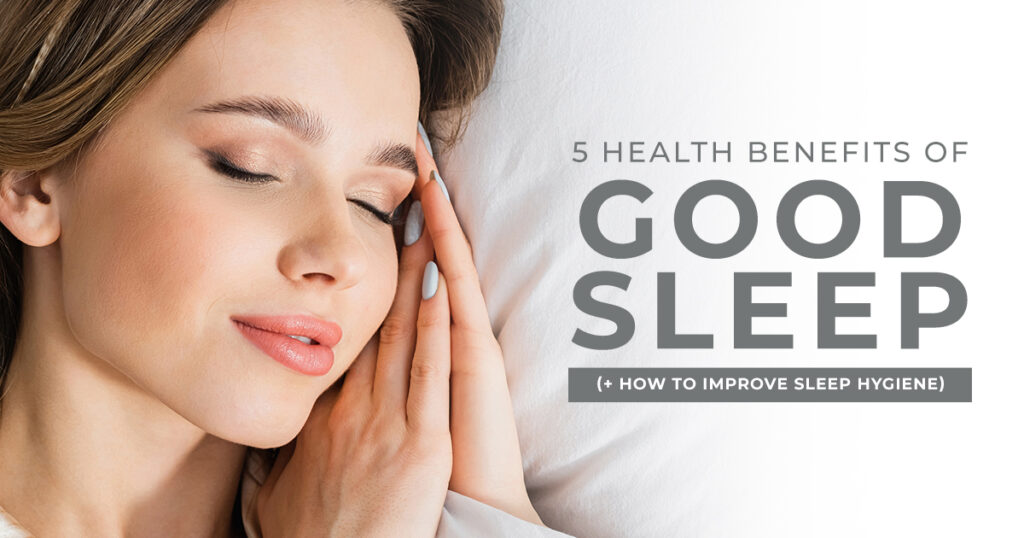If you’re tossing and turning each night, you’re not alone. Millions of people around the globe suffer from sleep-related problems. So, why is something as simple as a good night’s sleep so hard to attain?
For many, sleeplessness has become a way of life, thanks in large part to the glorification of “busy-ness” and reliance on digital technology. As a result, you’re yawning, groggy, and (worse yet) your health suffers. So, what’s the solution? The answer may lie in improving your sleep hygiene.
What’s keeping you up at night?
Sleep is so incredibly important for your health. Unfortunately, there’s a lot of stuff that gets in the way of a good night’s sleep. Chronic stress is one of the most common reasons for sleeplessness. Then there are a number of lifestyle habits that keep you up, like eating late into the evening, too much caffeine, or using a smartphone just before bed. And, of course, hormonal changes during menopause can also mess with your sleep.
Regardless of what’s keeping you up at night, there are several reasons prioritizing good quality sleep is important to your health.

Five Benefits Of Good Quality Sleep
Boosts your immune system
During sleep is when your immune system kicks into high gear. That’s because breathing and muscle activity slows to a crawl, which frees up energy for the immune system to do its job. A recent study in the Journal of Experimental Medicine found that solid sleep improves certain immune cells that recognize and fight off invading virus-infected cells.
If you aren’t getting enough sleep, these fighters can’t do their job properly. That could mean a higher chance of getting sick.
Helps prevent weight gain
Losing weight is a challenge. And poor sleep can make that challenge even greater. In fact, a study from the National Center for Health Statistics, Centers for Disease Control and Prevention, found that as sleep steadily decreased over the last three decades in the U.S., the BMI of Americans increased. It seems that poor sleep can lead to weight gain and obesity. One of the reasons may be the link between sleep and appetite.
Appetite starts in the brain. Neurotransmitters (or chemical messengers) in the brain are what control your appetite. During the day, these neurotransmitters let you know when it’s time to eat and when you’ve had enough. But when you’re sleep deprived, the body’s regulation of these messengers goes out of whack. As a result, you’re hungrier and eat past the point of feeling full.
Makes you more productive
Life is short, and while you’re awake you want to be as productive as you can. And while a heavy work schedule might tempt you to stay up late to get more done, losing out on sleep actually has an adverse effect. Being sleep deprived can leave you feeling groggy, unfocused, and less creative.
Think of sleep as your body and brain’s opportunity to “reboot”. Neurons begin a biological process while you sleep that refreshes the body, mind, and spirit. This reboot is vital for learning new information, thinking clearer, managing your emotions, creative problem solving, and generally being more productive.
Helps prevent depression
Poor sleep and depression often go hand in hand. A study in the Australian and New Zealand Journal of Psychiatry suggests that those suffering from insomnia are more likely to show signs of depression.
When you fall asleep, your body moves through various stages of sleep, including light sleep, deep sleep, and REM (rapid eye movement) sleep. Experiencing each of these sleep stages is important for supporting mental health.
Improves stress levels
Quality sleep calms the body, regulates mood, and improves stress. Lack of sleep, on the other hand, has a negative impact on physical and mental health. Not only can poor sleep increase stress, but increased stress can lead to poor sleep. It’s a vicious cycle, which is why getting a handle on your sleep is an important part of healthy stress management.
Tips for improving your sleep hygiene
A good night’s sleep is what makes the difference between an awesome day and a not-so-awesome day. And one of the best ways to improve your quality of sleep is by improving your sleep hygiene. Here’s how:
- Go to bed at the same time each night and get up at the same time each morning — even on the weekends.
- Create a quiet, dark, and relaxing environment in your bedroom.
- Get the TV out of the bedroom and designate the hour before bed as “screen-free time”.
- Avoid large meals, alcohol, and caffeine before bed.
- Exercise during the day, not too close to bedtime.
- Wind down at the end of the day with a cup of Golden Superfood Bliss, which helps soothe stress and promote quality sleep.*
Golden Superfood Bliss contains 12 powerful ingredients including superfoods, adaptogens, and ancient mushrooms. Just one rich and delicious scoop of Golden Superfood Bliss added to your favorite dairy-free milk before bed will help:
- Ease occasional stress and anxiety, so you fall asleep faster*
- Support a healthy inflammatory response, rebalance hormones, and relax your body*
- Combat cravings, boost immunity, and boost fat loss*
Golden Superfood Bliss is a great way to promote deep, restful sleep. Plus, it’s delicious! Click the link below to give it a try today!
Shop Golden Superfood Bliss Here!

*These statements have not been evaluated by the Food and Drug Administration. These products are not intended to diagnose, treat, cure, or prevent any disease.






